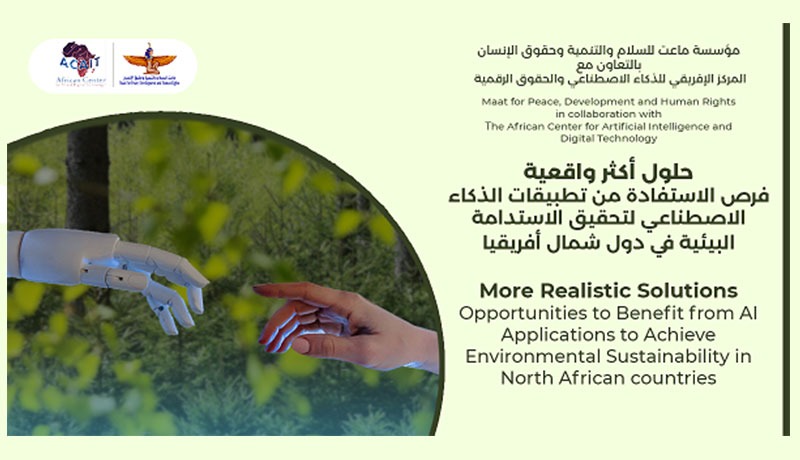
Every year on June 5th, the world celebrates World Environment Day (WED). Therefore, there is probably no better day than this day to reflect on the progress made to improve biodiversity, provide clean water and air, and combat the effects of climate change caused by global warming.
As a result, Maat for Peace, Development, and Human Rights, in cooperation with the African Center for Artificial Intelligence and Digital Technology (ACAIT), has used this opportunity to shed light on the potential opportunities of using artificial intelligence applications to achieve environmental sustainability in North African countries, by publishing a study illustrating and discussing environmental problems in North Africa.
The study also looked at some of the successful efforts made around the world to use artificial intelligence to improve environmental sustainability, with the goal of gaining some insights that could help change the current environmental situation in North African countries.
In this context, Ayman Okeil, an international human rights expert and the president of Maat, expressed deep concern about the emergence of environmental crises in the North African region, explaining that they pose an existential threat to all citizens there, as well as jeopardizing the realization of all human rights for present and future generations.
Without a doubt, artificial intelligence applications can be one of the solutions to major global environmental crises, as artificial intelligence and digital technology could result in a 10-20% reduction in global carbon dioxide emissions by 2030, which would positively impact future environmental recovery.
Okeil also urged many North African countries to learn from international experiences with artificial intelligence applications used to combat climate disasters.
Maha Jouini, CEO of the African Center for AI and Digital Technology, said that North African countries have a historic opportunity to rely on artificial intelligence techniques and local experience to find solutions to the climate change dilemma, which is threatening food security and affecting life’s necessities.
“The joint report prepared by Maat and the African Center aims to highlight the solutions available for these countries and emphasizes the need for cooperation between all the different parties to manage and adapt to climate change risks,” Jouini added.
In this regard, Muhammad Mukhtar, a researcher at Maat, added that there are several challenges limiting the North African region’s reliance on artificial intelligence applications to combat environmental disasters, topped by the need for funding to be invested in artificial intelligence applications related to environmental sustainability, let alone the ongoing threats posed by internal conflicts and terrorism.
Mukhtar, therefore, emphasized the importance of strengthening cooperation among North African countries in the exchange of research and studies related to enhancing artificial intelligence in combating environmental disasters.To view the study please follow this link: https://www.maatpeace.org/en/?p=35304
